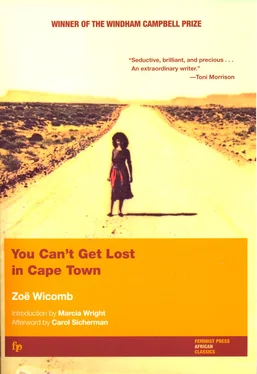The mouth of the cylinder curved outward for nine inches above the sand level. Here as a child I lay on my stomach to watch my framed face in the water below. And bent down with the cement wedged under my left armpit, I would scoop up the still water with a tin mug and in that vast silence listen to the rhythms of water lilted into tin, hauled up against the cement wall, and warble into the metal bucket. Before the buckets were filled the water supply would run out. And as the level fell the framed portrait faded, grew darker so that I would clasp with both arms the fat cement mouth, straining to see through my mocking image the new growth of water. Unless you whispered, coaxed, the water refused to rise. With my head hanging deep down in the darkness and the blood rushing hither and thither in my veins, I sang my song of supplication until the water spirits gurgled with pleasure and the face framed in the circle of water grew whole once more.
If the well were here still, if I could feel the pitted cement pressing into my naked armpits and stare at my severed head in the water, it would come — the song of supplication that will rouse the appropriate feelings in me.
My head nods to the tune but the words loiter on the tip of my tongue, scratch as they try to scale my slippery throat, and then a bird screams so that they scurry back down. Instead another chant from childhood takes over:
Bucket in the hand
Bucket on the head
Feet in the sand
Wish I were dead. (There was nothing else to rhyme with head.)
Over and over along the track as I balanced my way home with the buckets, stopping only once to change hands.
The traffic of words is maddening. I am persecuted by a body of words that performs regardless of my wishes, making its own choices. Words will saunter in and vanish in a flash, refusing to be summoned or expelled. Just as I cannot summon my heart to beat faster or slower, so the words in conversation could tumble out regardless or refuse to be uttered, betraying or making a fool of me. Thus the water song will not surface while the bucket chant will not be banished.
I follow the track which was once the well-worn path to our house. Half-way along I stop to look back. I can see the old man across climbing the hill. The tops of trees pop up above the straight line cut by the river. Across the river, the hills swell abruptly into a ridge that meets the sky in a straight line horizontal to the fissure of the river. The glaring white pebble crust of the hill lifts pointillistically in the sun, its squat succulents grey stipples in the distance. The railway line at the foot of the ridge parallel to the river has only just been built. I have not yet seen the ISCOR train running along it, its hundred or more trucks a black line of iron and steel drawn across the ridge. Or so Father said in his last letter. That there were a hundred and nine trucks that day, the longest ever to travel between Sishen and Saldanha Bay. Which means that he runs out to the train every other day to count the trucks, for how else would he know and why would he write immediately, a scribbled salutation and then the breathless news of a hundred and nine trucks, before the guarded demand that I spend the last days at home where everybody, all the family, is coming to see me?
Empty-handed I carry on walking towards the house. They are sitting on the stoep waiting for the breeze that will cool the day. The wind is just rising. On the dead plain, circles of dust are spun and lifted, up, up, spiralling into fine cones that dance teasingly in my path. Grains of sand whirl past and sting my cheeks. The hot breath of this wind brings no relief.
The party on the stoep is watching, no doubt discussing me, my marriage prospects, my waywardness and my unmistakable Shenton determination. There is no point in lingering. There is no concealed approach to the house. A head-on collision with all that consanguinity cannot be avoided. The bosoms of the aunts are mountainous; the men are large like trees. Aunt Nettie has timed the coffee to be ready at my arrival.
‘You’ve been a long time,’ someone says.
I smile, unable to summon a reply.
‘Ag, no,’ Father says, ‘let the girl be. She hasn’t seen the old place for such a long time.’
‘There’s no place like home,’ says Aunt Cissie.
‘And home is where the heart is,’ Father adds, and then he frowns for that is not quite what he means.
I watch him pour the coffee into his saucer. With lips pouted for the purpose, the liquid is syphoned from saucer to throat. Coffee trickles from his old man’s mouth. With the lower lip both protruding and sagging, the liquid has no choice but to drip on to his new crimplene trousers. He rubs the stain with the back of his hand.
‘Ag ja,’ Aunt Nettie sighs, ‘a woman’s work is never done.’ She casts a significant but fruitless look at her older sister before rising with the tray, her rear following reluctantly.
A conversation buzzes about my ears while the silly bucket rhyme mills through my mind.
‘What do you say, Frieda?’
There is no need to admit that I have not been listening. I do not have to say anything. The question is purely phatic. They have come to see me, to rest their eyes on me, reassured by the correctness of the family gathered here.
‘A person of few words, our Frieda,’ says Uncle Gerrie, ‘a sure sign of wisdom.’ I remember now, in his pre-gold-teeth days, Uncle Gerrie as a young man in a straw hat, trowel in his hand. ‘Baboon,’ he shouted at me. ‘Why is this ugly child always in the way?’ And he slap-slapped the cement, levelling off this very stoep. Not that this can really be called a stoep. Merely a two-foot-high block of cement on to which the kitchen door opens, keeping the dust at bay. There is no verandah, and without that protective structure the eyes cannot consume the land in the same way that the colonial stoep allows.
‘So you’ve been down to the river?’ he asks.
‘Yes, eh. ’ and the dots of hesitation hang like a row of fireflies in the dark until I find my voice to continue. ‘It must have been quite a flood. I barely recognised the place. I had some trouble trying to find the gorra but then I remembered the big tree and the gully.’
Father says, ‘The gorra’s been gone for nearly a year now. We even get our washing water from the dorp. Nice to get a good lather with soapsuds. I’m surprised you found the gorra; that whole bank’s completely washed away. Did you go beyond Blouklip? From there you can just about recognise the old gully.’
‘No.’
‘Then you lined up the tree with the wrong gully, I think. Yours is the recent one made by last year’s flood.’
Perhaps I ought to go to Blouklip now, but in this whirling dust I fear for my sinuses. It will be better indoors. I join Aunt Nettie in the kitchen where she dries the dishes but she clutches the dish towel to her chest when I offer to help.
‘No, you have a rest today,’ she says. ‘But don’t forget, my child, wherever you lodge — with a nice family of course — to always help with the work. Don’t just sit in your room with your books. A girl should help to keep the house tidy. And when you meet a nice man you’ll have the experience of housework.’ She winks awkwardly.
‘Yes,’ I say, and wander off into the sitting room where dust lies thickly spread over all the surfaces, inviting the calligraphy that will expose the polished wood beneath. On which of these surfaces would I write my guilty secret? I would not dare. Not here where Mother sat in the late afternoons, after the wind had dropped, her voice rumbling distantly through the phlegm, her mouth opening and closing frog-like as she snapped up the air. Here she sat to recover her breath before dusting, her asthmatic breathing filling the room, her face uplifted as if God squatted just there, above, on the other side of the galvanised iron roof. And inside, below, always the tap-tap of the roof as the iron contracted, tap-tap like huge drops of rain falling individually, deliberately. But drops of rain would sizzle on the hot iron and roll off evaporating, hissing as they rolled. So merely the sound of molecular arrangement in the falling temperature of the iron. Even now that ceilings have been put in, still a tap-tap that stops and a silence followed by a tap-shudder-tap for all the world as if she were still sitting there gasping for breath with her God just on the other side.
Читать дальше












